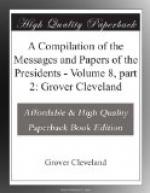Article 11. The first paragraph of
this article respecting the
droit d’aubaine to be omitted, that
law being supposed peculiar
to France.
Article 17, giving asylum in the ports of either to the armed vessels of the other with the prizes taken from the enemies of that other, must be qualified as it is in the nineteenth article of the Prussian treaty, as the stipulation in the latter part of the article that “no shelter or refuge shall be given in the ports of the one to such as shall have made prize on the subjects of the other of the parties” would forbid us, in case of a war between France and Spain, to give shelter in our ports to prizes made by the latter on the former, while the first part of the article would oblige us to shelter those made by the former on the latter—a very dangerous covenant, and which ought never to be repeated in any other instance.
Article 29. Consuls should be received
at all the ports at which the
vessels of either party may be received.
Article 30, concerning free ports in Europe and America, free ports in the Spanish possessions in America, and particularly at The Havannah, are more to be desired than expected. It can therefore only be recommended to the best endeavors of the commissioners to obtain them. It will be something to obtain for our vessels, flour, etc., admission to those ports during their pleasure. In like manner, if they could be prevailed on to reestablish our right of cutting logwood in the Bay of Campeachy on the footing on which it stood before the treaty of 1763, it would be desirable and not endanger to us any contest with the English, who by the revolution treaty are restrained to the southeastern parts of Yucatan.
Article 31. The act of ratification on our part may require a twelvemonth from the date of the treaty, as the Senate meets regularly but once a year; and to return it to Madrid for exchange may require four months more.
The treaty must not exceed —— years’ duration, except the clauses relating to boundary and the navigation of the Mississippi, which must be perpetual and final. Indeed, these two subjects had better be in a separate instrument.
There might have been mentioned a third species of arrangement—that of making special agreements on every special subject of commerce, and of settling a tariff of duty to be paid on each side on every particular article; but this would require in our commissioners a very minute knowledge of our commerce, as it is impossible to foresee every proposition of this kind which might be brought into discussion and to prepare them for it by information and instruction from hence. Our commerce, too, is as yet rather in a course of experiment, and the channels in which it will ultimately flow are not sufficiently known to enable us to provide for it by special agreement;




